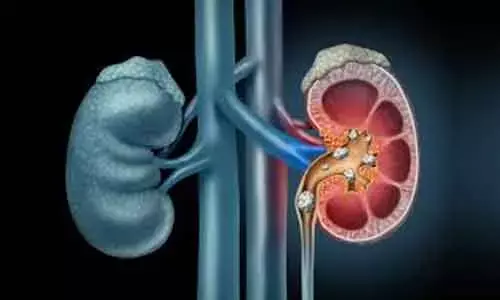- Home
- Medical news & Guidelines
- Anesthesiology
- Cardiology and CTVS
- Critical Care
- Dentistry
- Dermatology
- Diabetes and Endocrinology
- ENT
- Gastroenterology
- Medicine
- Nephrology
- Neurology
- Obstretics-Gynaecology
- Oncology
- Ophthalmology
- Orthopaedics
- Pediatrics-Neonatology
- Psychiatry
- Pulmonology
- Radiology
- Surgery
- Urology
- Laboratory Medicine
- Diet
- Nursing
- Paramedical
- Physiotherapy
- Health news
- Fact Check
- Bone Health Fact Check
- Brain Health Fact Check
- Cancer Related Fact Check
- Child Care Fact Check
- Dental and oral health fact check
- Diabetes and metabolic health fact check
- Diet and Nutrition Fact Check
- Eye and ENT Care Fact Check
- Fitness fact check
- Gut health fact check
- Heart health fact check
- Kidney health fact check
- Medical education fact check
- Men's health fact check
- Respiratory fact check
- Skin and hair care fact check
- Vaccine and Immunization fact check
- Women's health fact check
- AYUSH
- State News
- Andaman and Nicobar Islands
- Andhra Pradesh
- Arunachal Pradesh
- Assam
- Bihar
- Chandigarh
- Chattisgarh
- Dadra and Nagar Haveli
- Daman and Diu
- Delhi
- Goa
- Gujarat
- Haryana
- Himachal Pradesh
- Jammu & Kashmir
- Jharkhand
- Karnataka
- Kerala
- Ladakh
- Lakshadweep
- Madhya Pradesh
- Maharashtra
- Manipur
- Meghalaya
- Mizoram
- Nagaland
- Odisha
- Puducherry
- Punjab
- Rajasthan
- Sikkim
- Tamil Nadu
- Telangana
- Tripura
- Uttar Pradesh
- Uttrakhand
- West Bengal
- Medical Education
- Industry
Increased water intake may not prevent primary formation of kidney stones: Cochrane Review

China: Drinking more water may reduce the risk of kidney stones coming back, according to a recent Cochrane Review. Also, it may prolong the time it takes for stones to come back.
The study, however, found no evidence on the role of increased water intake for primary prevention of urinary stones. In the study, the increased water intake was defined as achieving a urine volume of at least 2.0 L per day by drinking water.
Urinary stone disease is a common condition characterized by high rates of recurrence and increasing prevalence. Observational studies have shown increased water intake to prevent the formation of urinary stones but has limited evidence.
Qiang Wei, Department of Urology, West China Hospital, Sichuan University, Chengdu, China, and colleagues compare the effects of increased water intake with standard water intake for the prevention of urinary stone formation in participants with or without a history of urinary stones.
For the purpose, the researchers examined research published up to October 2019. Randomized controlled trials (RCTs) that looked at benefits and harms of increased water intake versus standard water intake for the prevention of urinary stone formation in participants with or without a history of urinary stones were included.
This trial randomized 220 participants (110 participants in the intervention group with increased water intake and 110 in the control group with standard water intake). The average age was approximately 41 years, and two-thirds of the participants were men.
Key findings of the study include:
- Increased water intake may decrease stone recurrences (RR 0.45); this corresponds to 149 fewer (43 fewer to 205 fewer) stone recurrences per 1000 participants with 270 stone recurrence per 1000 participants over five years in the control group.
- Increased water intake may also prolong the time to urinary stone recurrence compared to standard water intake (HR 0.40; 199 participants; low‐certainty evidence); based on a stone recurrence rate of 270 per 1000 participants over five years, this corresponds to 152 fewer (209 fewer to 50 fewer) recurrences per 1000 participants.
- For both outcomes we downgraded the certainty of evidence for study limitations and imprecision.
- No evidence was found for the outcome of adverse events.
"We found no RCT evidence on the role of increased water intake for primary prevention of urinary stones," wrote the authors. "For secondary prevention, increased water intake may reduce urinary stone recurrence and prolong time to recurrence for people with a history of urinary stone disease. However, our confidence in these findings is limited. We did not find evidence for adverse events."
The study, "Water for preventing urinary stones," is published in Cochrane Library.
Dr Kamal Kant Kohli-MBBS, DTCD- a chest specialist with more than 30 years of practice and a flair for writing clinical articles, Dr Kamal Kant Kohli joined Medical Dialogues as a Chief Editor of Medical News. Besides writing articles, as an editor, he proofreads and verifies all the medical content published on Medical Dialogues including those coming from journals, studies,medical conferences,guidelines etc. Email: drkohli@medicaldialogues.in. Contact no. 011-43720751


